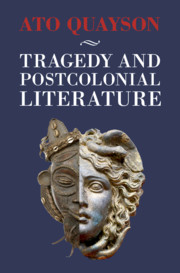Refine search
Actions for selected content:
2 results

Tragedy and Postcolonial Literature
-
- Published online:
- 05 February 2021
- Print publication:
- 21 January 2021
Chapter 6 - Form, Freedom, and Ethical Choice in Toni Morrison’s Beloved
-
- Book:
- Tragedy and Postcolonial Literature
- Published online:
- 05 February 2021
- Print publication:
- 21 January 2021, pp 186-212
-
- Chapter
- Export citation
